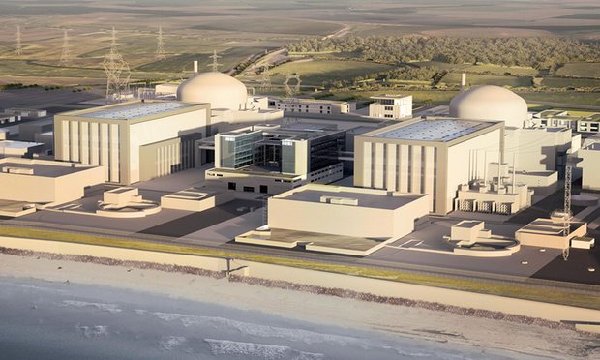UK can't afford recklessness like the Hinkley Point review
- By Sumantra Maitra
 0 Comment(s)
0 Comment(s) Print
Print E-mail China.org.cn, August 8, 2016
E-mail China.org.cn, August 8, 2016
|
|
|
A computer-generated image of the Hinkley Point C nuclear power plant. |
The Hinkley Point C nuclear power plant stoppage by Theresa May's government has revised issues between China and U.K. The review comes at a strange time, and is giving a hint as to the premiership of May or what it might turn out to be. Post EU Referendum, May took over the reins from David Cameron and his right hand man George Osborne. Within the first month, there was a massive purge at the front benches of the British parliament, and surprisingly, May sent every one even vaguely notable or associated with the previous government, to the back benches. It is surprising because for a Tory party government with a razor thin majority she seems to be quite cavalier about antagonizing her own party heavyweights, those same people whose support she will need in any serious parliamentary votes. Whether this is prudent and calculating, or just plain dumb, remains to be seen. It could be possible that she is counting on the support of rebel Labour party members, in crucial votes, but again, that's risky politics.
This brings us to the Hinkley point issue. First of all, it is understandable that a new PM will take time to review the projects of her predecessor, especially something which might be related to national security and energy. One cannot imagine the same pro-market swagger from May, like Cameron and Osborne, considering that the same party has been hammered in the EU Ref polls, and considering that Labour has been losing the social conservative and fiscally leftwing votes to the Tories for some time. It was a calculated decision, and it was completely in character with Theresa May and marked how her tenure might play out; cautious and socio-economically much more left wing than her predecessor. However, the way it was done reeked of rank amateurism. The review and stoppage was announced at the last moment, without any proper notice. It left the journalists and the Chinese side waiting for the inauguration in limbo, and it left the workers' unions in shock.
The questions that circulated here were two fold; firstly, is it a dangerous security risk, and secondly, how much will it affect Britain's reputation now that it is trying to bargain a place out of the EU and trying to have more foreign investments from big economies?
The answer to the first question is that it is unlikely that it is going to be a security risk for the U.K. Nuclear energy is one form of energy which inspires a lot of fear and paranoia among everyone, even though scientifically it has been proven to be the safest and cheapest source of energy and power for a power starved society. It is much more ecofriendly than coal or oil, it is much more economically feasible than wind or solar energy, and it is statistically the safest source of power with the least option of accidents, even post Fukushima. It is impossible to believe and is a stable fodder for conspiracy theories, but it doesn't change the fact that it is the safest source of energy.
The second point is inter-governmental security risks, or in other words, espionage between China and the U.K. Even considering this, it's safer and has already passed a GCHQ test under the previous government. First of all, the security infrastructure will have to be vetted by the government during construction and will be under constant supervision by the British government. Secondly, the software and other cybersecurity will be vetted by the government as well. For example, according to Motherboard, 50 percent of BT's 21st Century Network runs on equipment by Huawei, which has been carefully vetted by a group of former GCHQ employees set up by the government to check through any potential leaks. So, to sound the simple drum, there is a minimal risk of espionage.
The risk however is one of signaling. To put it simply, the U.K. cannot afford to upset everyone on the planet. The May government can afford to take this risk, because of an incompetent opposition, but it is neither prudent nor commendable. The U.K. needs investment from outside, and these kinds of reckless acts give false signals to potential outside investors and scare the market. Can Theresa May really afford this at this juncture?
Sumantra Maitra is a columnist with China.org.cn. For more information please visit:
http://www.china.org.cn/opinion/SumantraMaitra.htm
Opinion articles reflect the views of their authors only, not necessarily those of China.org.cn







Go to Forum >>0 Comment(s)